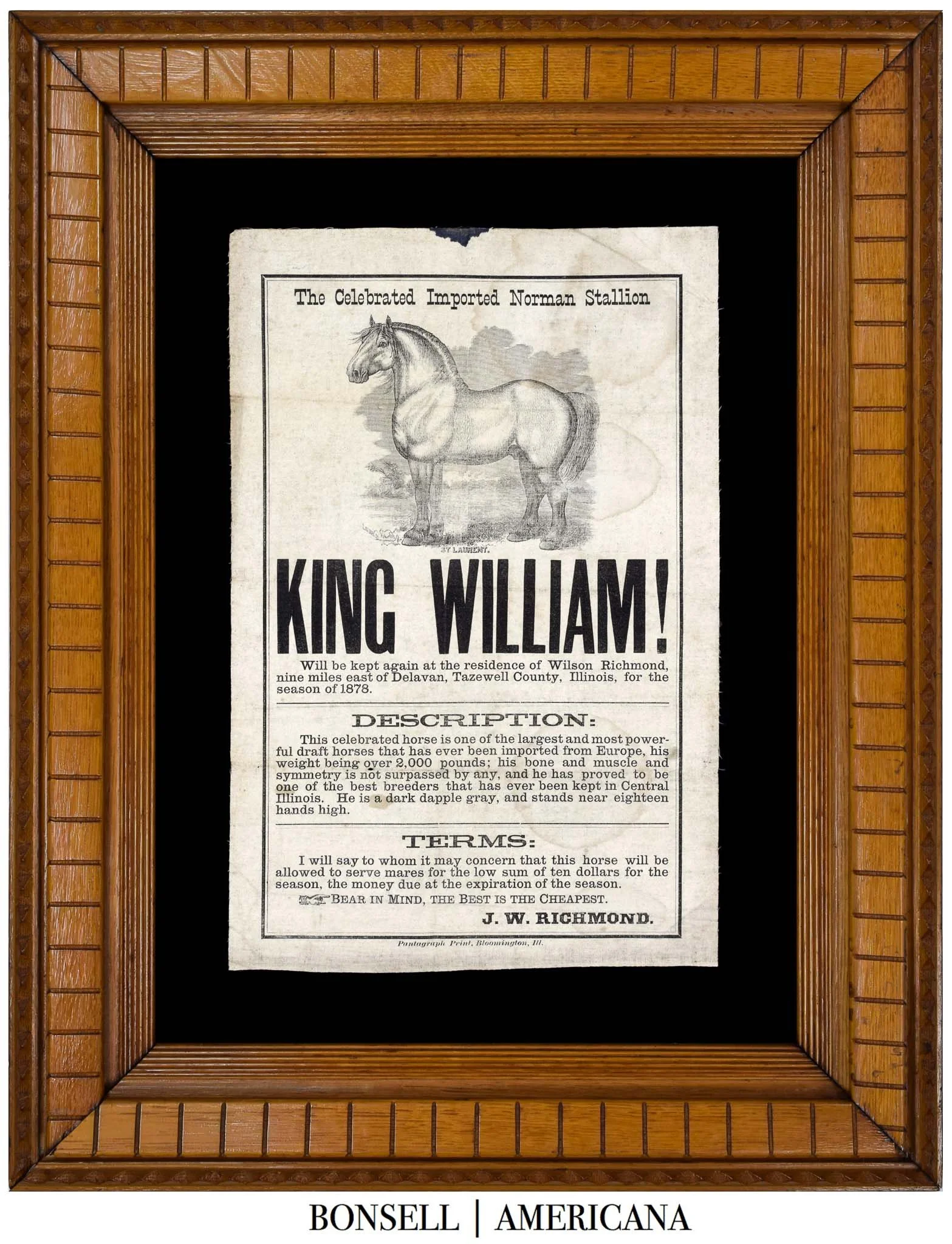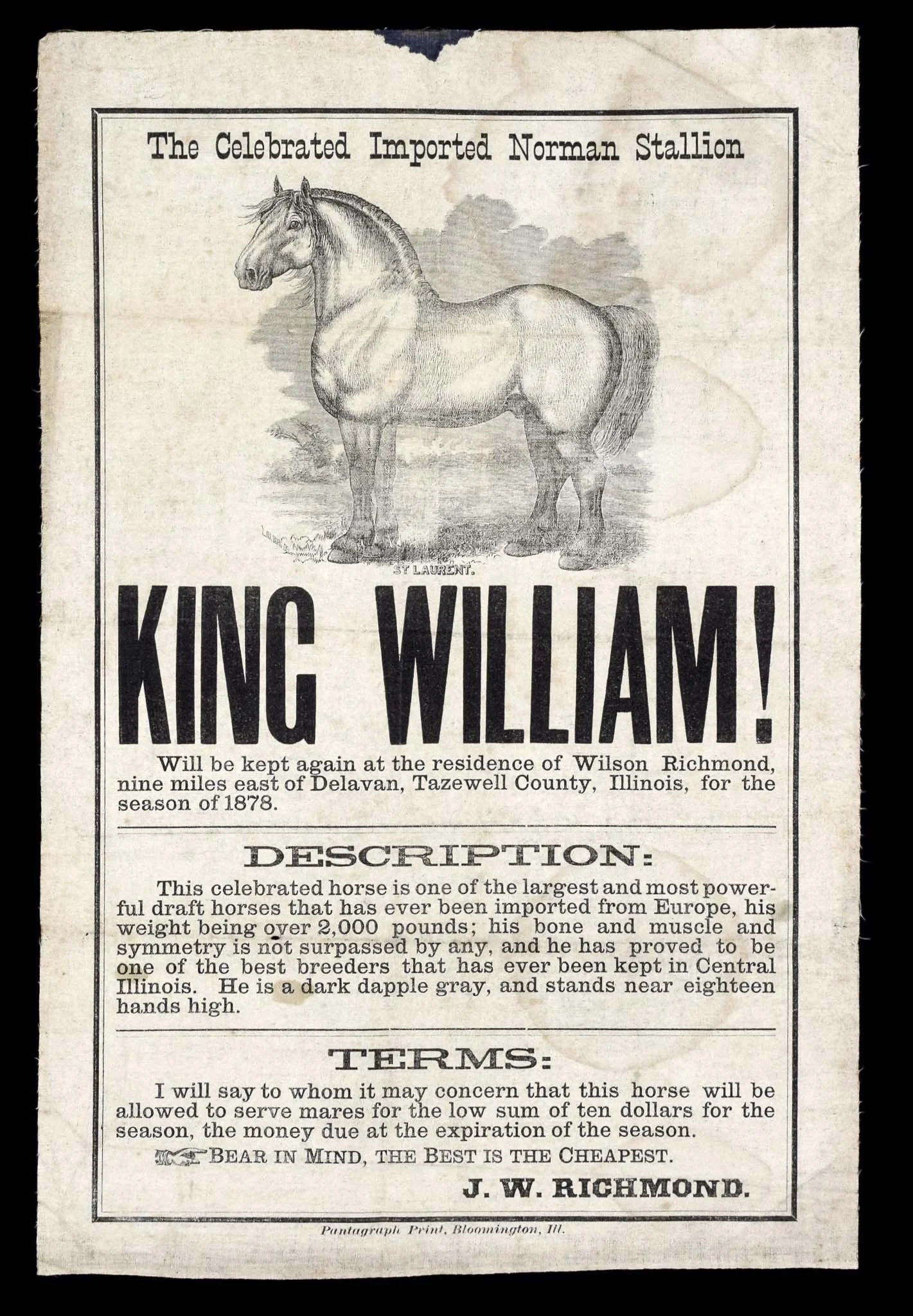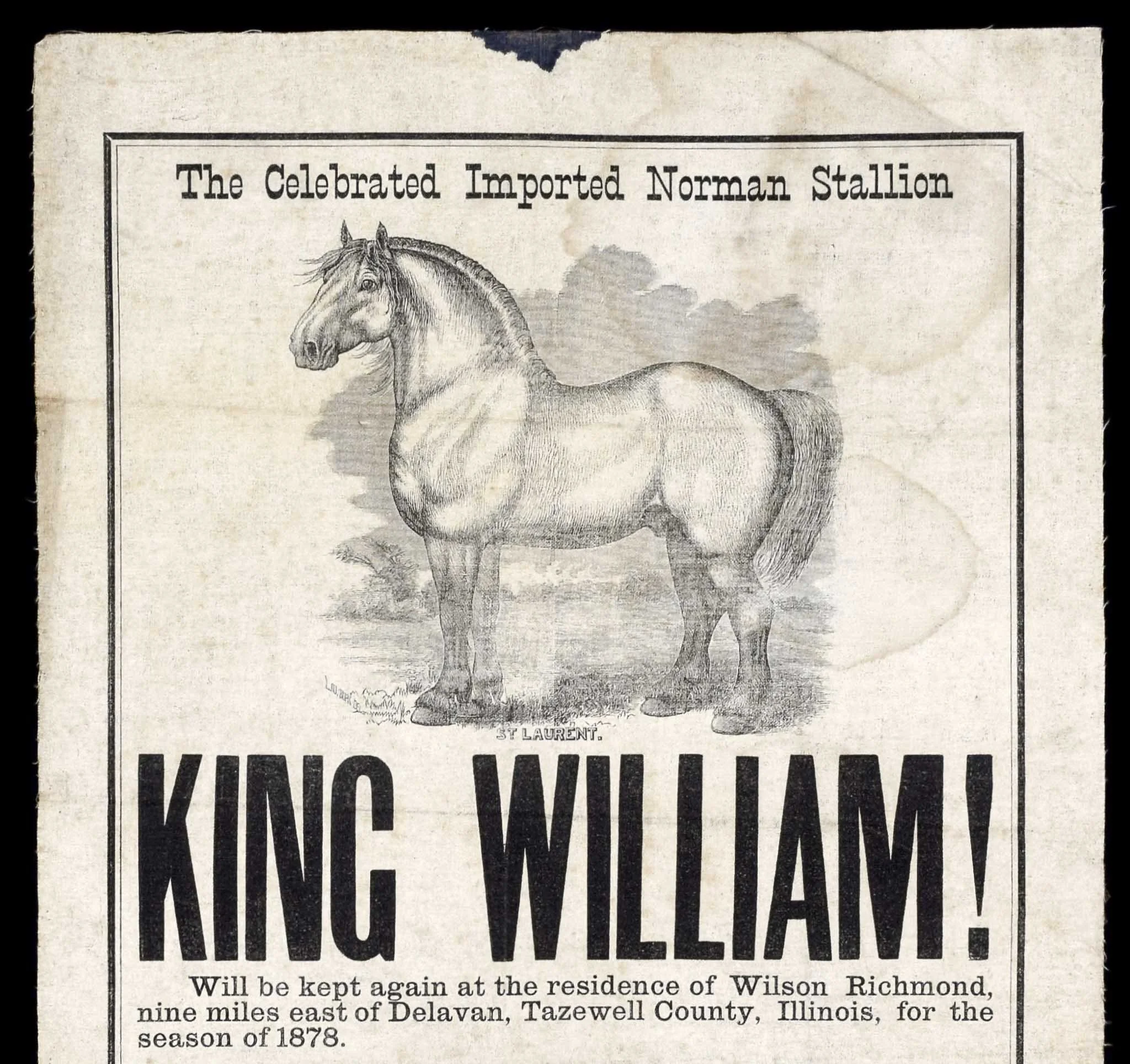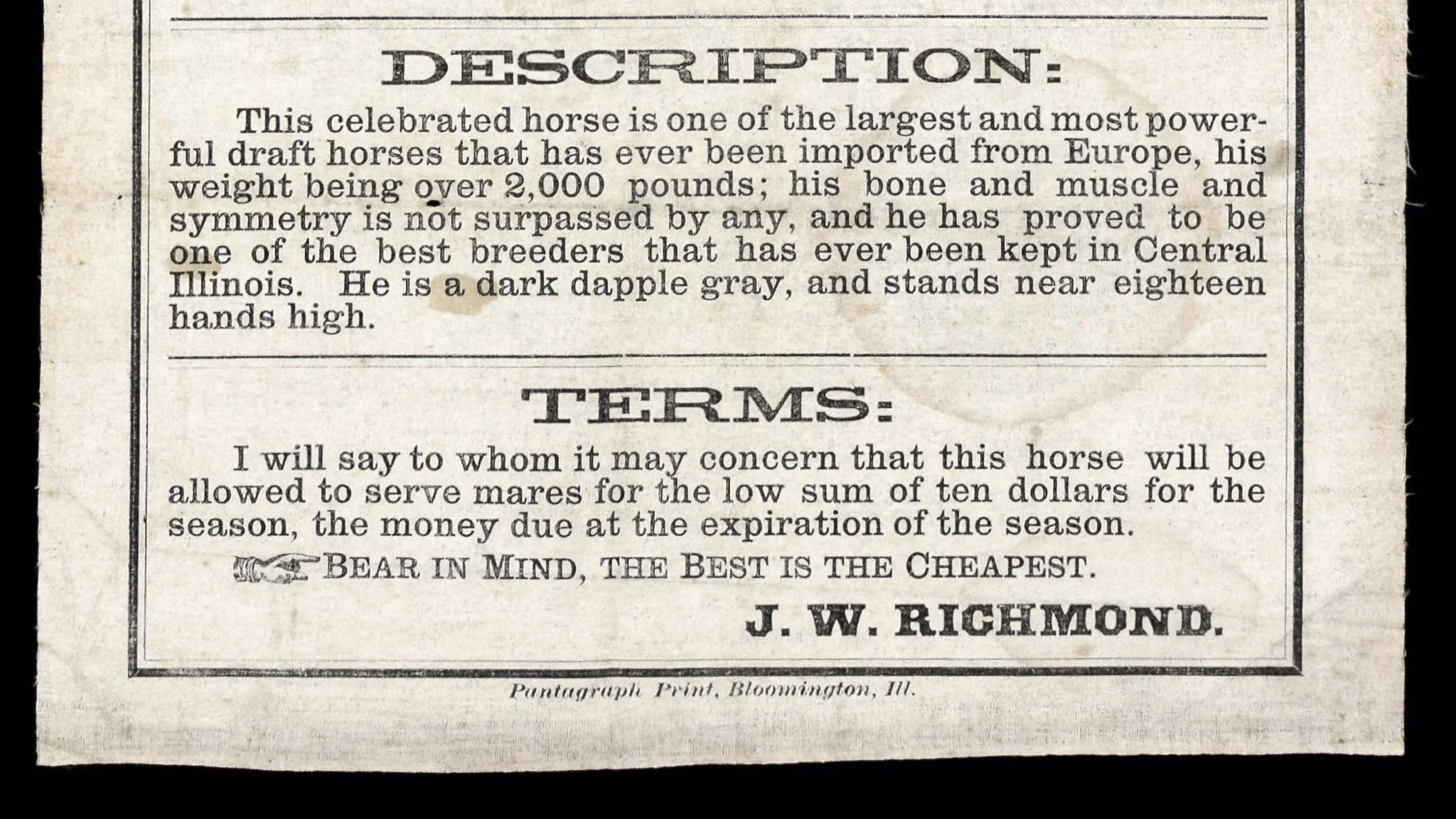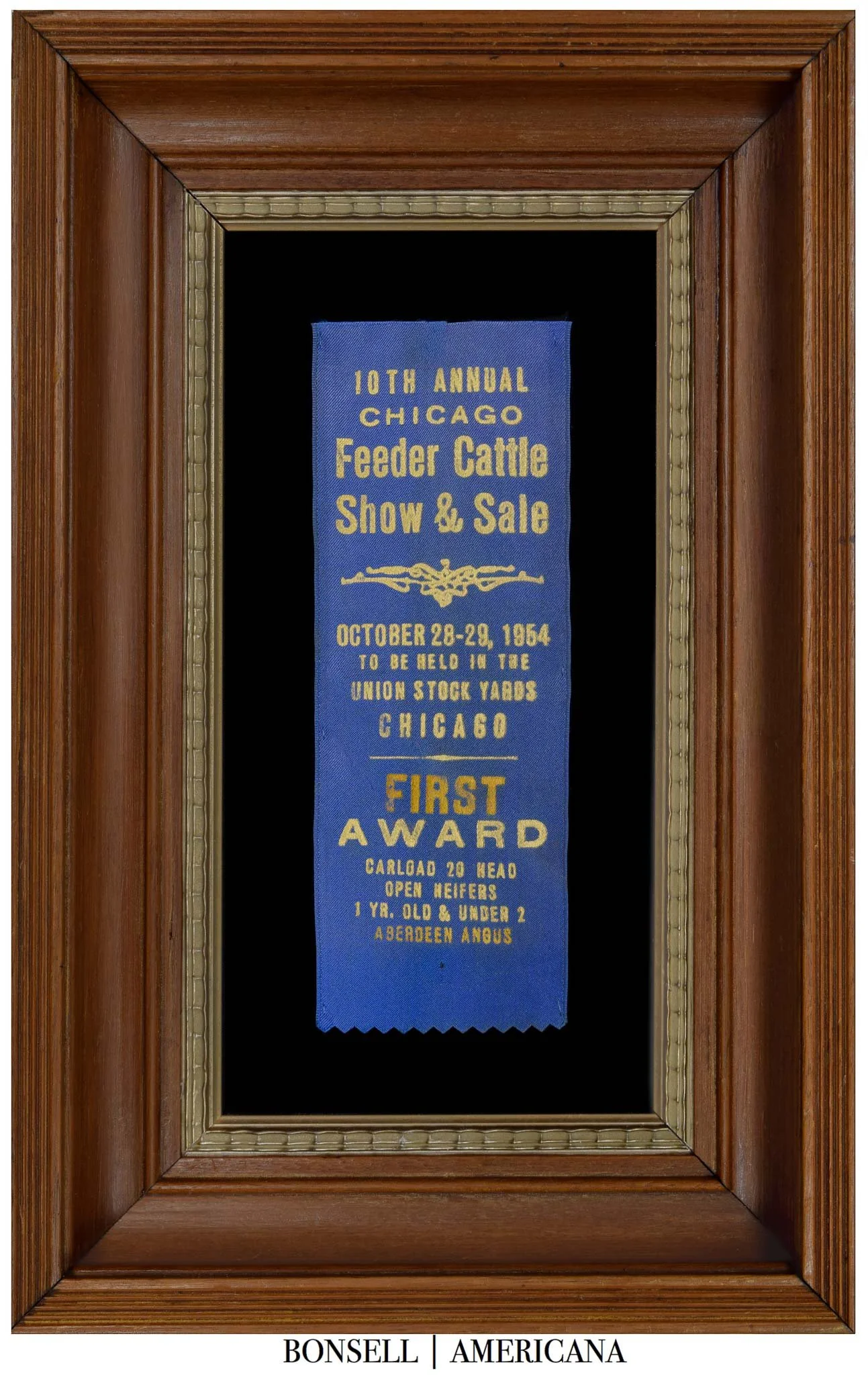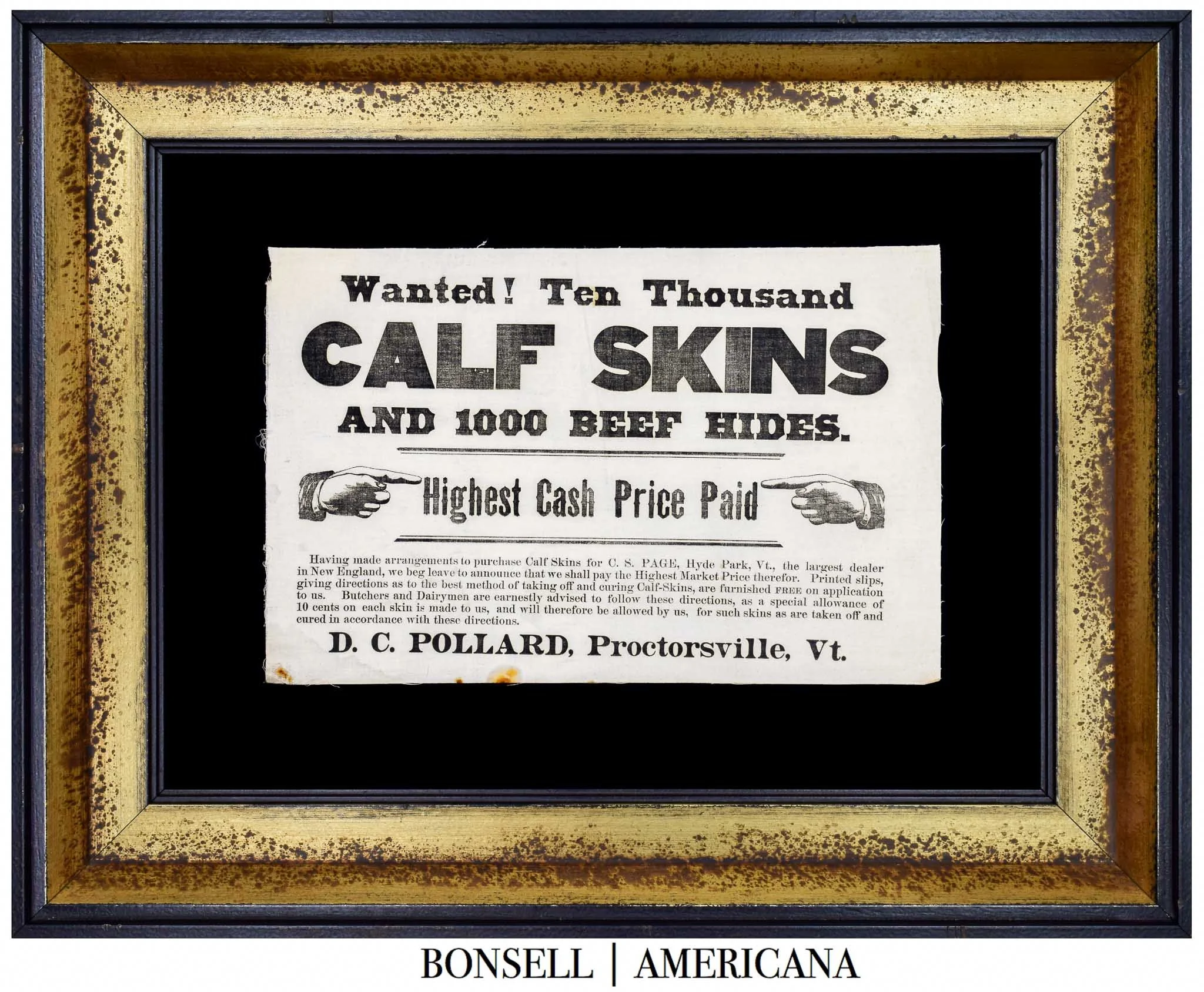Striking King William Cotton Broadside | The Celebrated Imported Norman Stallion | Made by Pantagraph Print of Bloomington, Illinois | Circa 1878
Striking King William Cotton Broadside | The Celebrated Imported Norman Stallion | Made by Pantagraph Print of Bloomington, Illinois | Circa 1878
Frame Size (H x L): 28.5” x 22.5”
Broadside Size (H x L): 18” x 12”
Offered is a striking broadside, dating to 1878, advertising the celebrated imported Norman Stallion, King Williams, owned by J. Wilson Richmond of Tazewell County, Illinois. It is one of the best broadsides that we have ever encountered and quite unusual, in part because of its outstanding subject matter and in part because it is printed on cotton. The broadside features a portrait King Williams and states the following:
The Celebrated Imported Norman Stallion.
KING WILLIAM!
Will be kept again at the residence of Wilson Richmond, nine miles east of Delavan, Tazewell County, Illinois for the season of 1878.
DESCRIPTION:
This celebrated horse is one of the largest and most powerful draft horses that has ever been imported from Europe, his weight being over 2,000 pounds; his bone and muscle and symmetry is not surpassed by any, and he has proved to be one of the best breeders that has ever been kept in Central Illinois. He is a dark dapple gray, and stands near eighteen hands high.
TERMS:
I will say to whom it may concern that this horse will be allowed to serve mares for the low sum of ten dollars for the season, the money due at the expiration of the season.
BEAR IN MIND, THE BEST IS THE CHEAPEST.
J.W. RICHMOND.
Pantagraph Print, Bloomington, Ill.
Pantagraph Print, most recently referred to as Pantagraph Printing and Stationery, was founded in 1860 and located at 217 W. Jefferson Street in Bloomington, Illinois. It closed in December of 2020.
J.W. Richmond’s remarkable biography, as recorded in 1900 in the Biographical Record of Champaign County, Illinois, is as follows:
J.W. RICHMOND, of Fisher, Champaign county, needs no introduction to the people of this section of the state, as he has been actively engaged in farming and stock raising here for many years, and has made an enviable reputation as a keen financier and business man. The history of a successful man is always of interest to the public, and the hosts of friends of Mr. Richmond will be especially desirous of tracing his career and noting some of the features of his character as shown by the masterly way in which he overcame difficulties and wrought his own prosperity unaided by others.
To one knowing the patriotic spirit of Mr. Richmond it is no surprise to learn that he comes of the grand old Revolutionary stock, and that his great grand-father, Colonel Frank Richmond, was one of those heroes who laid life and fortune and all personal aims and ambitions upon the altar of his country, resolved to sacrifice everything, if necessary, for the triumph of the principles of justice and liberty in which be believed. The gallant colonel, who owned goodly estates in Virginia, his native state, won his title by long and meritorious service in Washington’s army, and not until victory had lighted upon our banners did he sheath his sword. Quite as patriotic service was performed by him in his voluntary contribution of more than one thousand head of horses and cattle to the struggling young government. When peace had been proclaimed he returned to his quiet life as a country gentleman, and passed his last days upon his old plantation, secure in his dear bought liberty. Tradition says that the city of Richmond, Virginia, was named in honor of the Richmond who first settled in the state of Virginia, the family being very prominent at the time.
Joseph, son of Colonel Richmond, was born at the old Virginia home, and having been reared in the principle that country has the first claim upon a loyal citizen it is not strange that he, too, took up the old musket which his father had carried in the Revolution, and went forth to meet the same foe in the war of 1812. Later he went to the new state of Ohio, and settled upon a tract of land in Muskingum county. He married there, and his son, Wilson, father of our subject, was born on the old homestead cleared in the midst of the forest, the date of the event being September 9, 1815. In 1830 the family removed to Illinois, where the father had been granted some land in consideration of the services rendered in the second war with Great Britain. This property was located in Tazewell county, and here, on the prairies, swept by the keen winter winds from the great northwest, the pioneers found that they had many difficulties to meet, which had not been included in their experience hitherto. In 1831, the winter of the “big snow,” as the early settlers termed it, the husband and father perished with the cold while returning home from a trip to Mackinaw, then the county seat. Thus the care of the family devolved largely upon Wilson Richmond, who was the eldest of the seven surviving children. He nobly aided his mother in the task of rearing the younger brothers and sisters, and when he felt free to establish a home for himself he wedded Mary Judy, daughter of John Judy, both natives of Ohio. Mr. Judy was a veteran of the war of 1812, and was one of the first settlers of Tazewell county. It is a pleasure to record that success blessed nearly every undertaking of Wilson Richmond, and that by honest toil and well directed energy he became wealthy and extremely influential in Tazewell county, where he is yet living, hale and happy, despite his eighty-five years. During the Civil War he was extensively engaged in the raising of sheep, annually selling from fifteen hundred to two thousand fleeces, and, as cotton could not be cultivated in the south to any extent for several years, his product him handsome income. Gradually buying real estate, he at length was the possessor of about fifteen hundred acres of fine farm land.
J.W. Richmond, whose birth occurred on his father’s farm in Tazewll county, February 26, 1845, early acquired familiarity with agriculture in all its departments, and from the time that he was fifteen years of age until he left home, in 1845, he superintended his father’s large homestead. At intervals he invested in land upon his own account, and owned in the neighborhood of eighteen hundred acres of fine farm property when he came to Champaign county as a permanent resident, at the time of his marriage. He has improved several farms since then and at the present time is the proprietor of about three thousand acres of land, most of this being located within the boundaries in the best districts of Iowa, Indiana, Nebraska, and Kansas.
More than a quarter of a century ago, J.W. Richmond determined to devote some attention to the matter of raising and dealing in high grade horses and cattle. In 1874 he made his first trip to Europe, and brought back some fine Percheron horses. Later he imported coach and Shire horses in large numbers and, altogether, has made five journeys to the old world, traveling through England, Germany, France, Belgium and Holland. He owns some famous blue grass pasture land along the Sangamon river, and for many years has made a business of feeding cattle for the market, selling from one hundred to one hundred and seventy head of stock each year.
Sixteen years ago Mr. Richmond and Nora Havenhill were married in New York. She was born in Monroe, Kendall county, Illinois, and is a daughter of Hiram Havenhill, a pioneer of Tazewell county, and late a resident of Kendall county, this state. Four children bless the home of our subject and wife, namely: Wilson, Lelia, Cummings, and Arthur Dean.
Since becoming a citizen of Fisher, Mr. Richmond has made five additions to the town, and in numerous substantial ways has increased the prosperity of the place. He is a stanch Republican, but in no sense the word is a politician, and has resolutely declined to hold office. In the Masonic fraternity he stands high, and has attained the Knight Templar degree, being identified with the Urbana Commandery.
Conservation Process: This broadside was hand sewn to cotton fabric, and both were hand sewn to a mounting board. To prevent the black dye in the cotton fabric from seeping into the broadside, it was first washed in a standard wash and then in a dye setting wash. The broadside is positioned behind Optium Museum Acrylic.
Frame: The broadside is in a fine oak frame that dates to approximately 1885.
Condition: As shown in the images, there are light stains across the surface of the broadside. There is an ink stain along the top edge. The ink stain is likely associated with the printing of the broadside (i.e., a printing error). Overall, it is striking and attractive.
Collectability Level: The Best – Perfect for Advanced Collectors
Date of Origin: 1878

